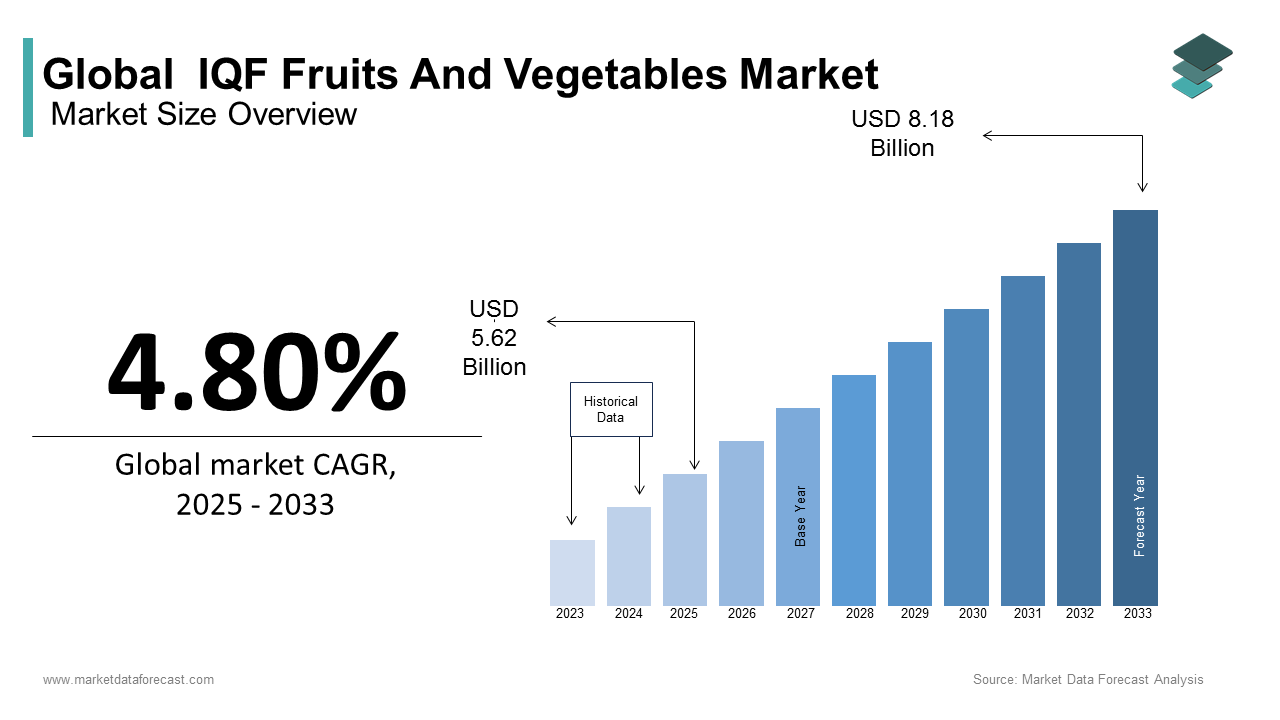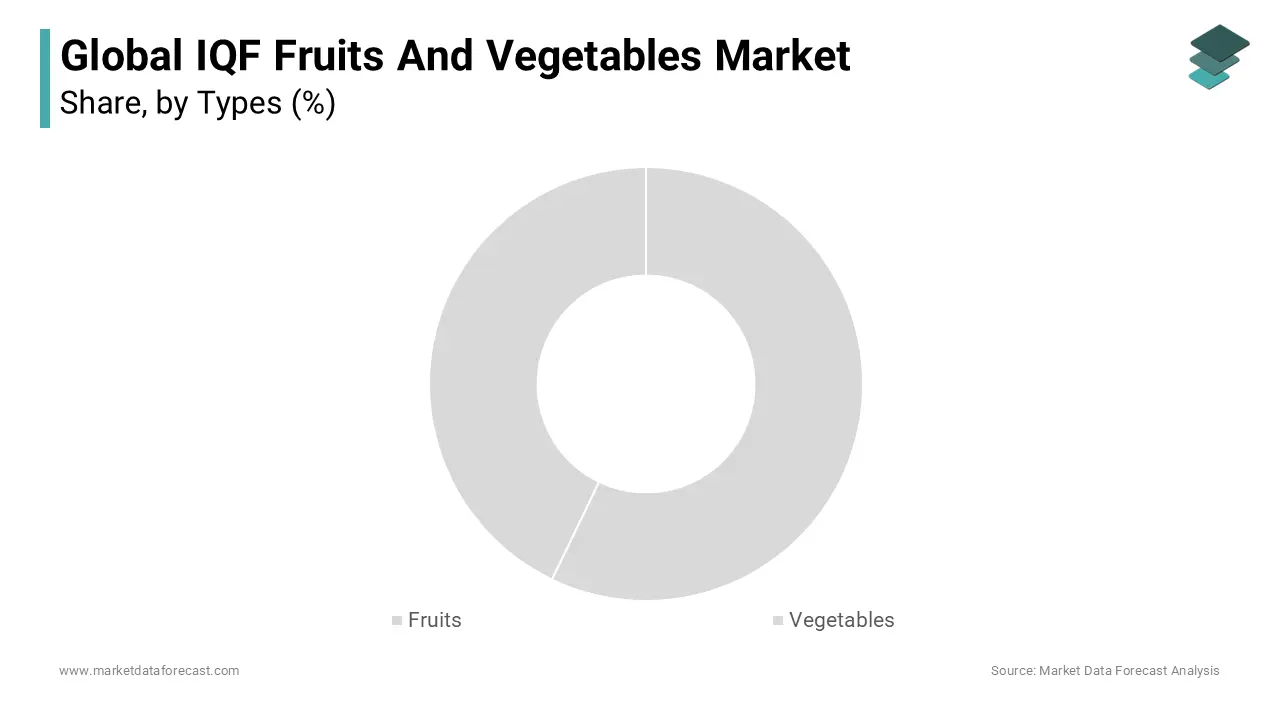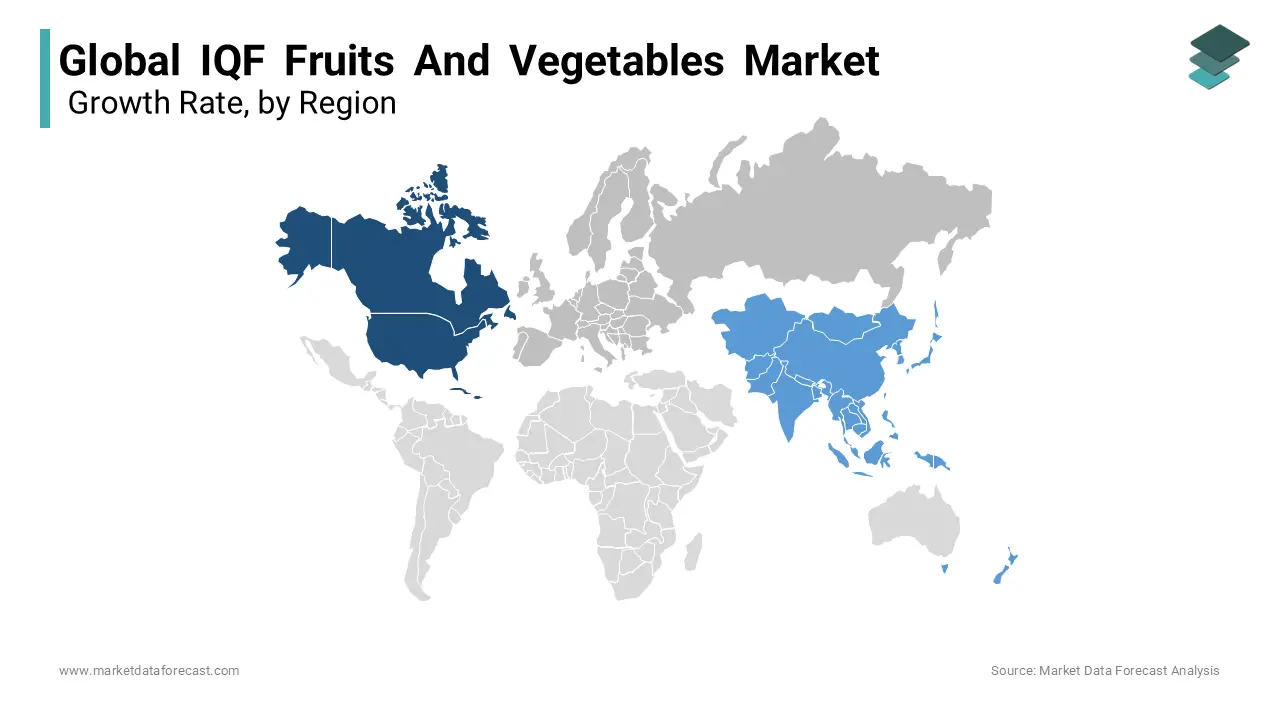Global IQF Fruits And Vegetables Market Size, Share, Trends & Growth Forecast Report - Segmented By Types (Fruits Which Include Berries, Bananas, Mango, Apple, Papaya, Pineapple, Kiwi And Others And Vegetables Which Include Carrots, Beans, Peas, Corn, Potato, Broccoli, Cauliflower And Others), Distribution (Retail Outlets, Online Stores And Hypermarkets), End Users (Hotels/Catering And Food Manufacturers), And Region(North America, Europe, Asia-Pacific, Latin America, Middle East And Africa) - Global Industry Analysis, Size, Share, Growth, Trends And Forecast 2025 To 2033
Global IQF Fruits And Vegetables Market Size
The size of the global IQF fruits and vegetables market was expected to be worth USD 5.36 billion in 2024 and is anticipated to be worth USD 8.18 billion by 2033 from USD 5.62 billion in 2025, growing at a CAGR of 4.80% during the forecast period

IQF's fruits and vegetables support a small percentage of total fruit and vegetable consumption. The global IQF fruit and vegetable market has gained significance because of the advantages related to the consumption of fruits and vegetables. Based on the technological advances and benefits of IQF fruits and vegetables, it is easy to reach and inexpensive for customers with strong backing. Rapidly changing life has led to consumer penchant for hygienic and readily available fruit and vegetable products, which has eliminated the hassle of conventional chopping and cleaning and has brought the IQF fruit and vegetable market to a greater extent. Extending shelf life, increasing consumer readiness for technological innovation in healthy foods and packaging will further accelerate the growth of the global IQF fruit and vegetable market.
MARKET DRIVERS
The growing demand from food manufacturers for the long-term preservation of food products for use as ingredients in end products is a major expansion of the global IQF fruit and vegetable market.
The increase in the working-class population will continue to contribute significantly to increased sales. IQF fruits and vegetables are stored at low temperatures or in the refrigerator. This technology is ideal for preserving seasonal fruits and vegetables as they are made up of the same nutritional value that they have in a fresh form that supports growth worldwide after freezing. Additionally, it is expected to drive demand for IQF fruits and vegetables worldwide with its easy-to-store and low-price features. Also, demand for the IQF fruit and vegetable market is increasing during the forecast period due to the increasing demand from food manufacturers to preserve food for a long time and use it as raw material for final products. The rise in the intake of frozen fruits and vegetables is supposed to accelerate the expansion of the global IQF fruits and vegetables business. IQF's main fruit and vegetable end-users are hotel, catering and food manufacturers. A major expansion in the IQF fruit market is the growing demand from food manufacturers to maintain food as an ingredient for long-term use in end products. An increase in the working-class population will continue to expand sales in the global IQF fruits and vegetables market. In addition, IQF fruits have important properties that protect them from deterioration during severe transportation, as well as poor exposure. Consumption of products using IQF fruits and ingredients is expected to show well in the global market, with rising GDP and increased consumer health awareness.
The global market demand for IQF vegetables is increasing due to the need to quickly and cumbersome transport of vegetables from procurement points to various distribution channels. Key players in the global IQF fruit and vegetable market are determined to concentrate on the development of innovative promotions and packaging. Individual Quick Freeze (IQF) is a technique for freezing fresh fruits and vegetables at very low temperatures so that fresh fruits and vegetables can be kept for more than a year, and retain the same color, flavor, and texture until they last. Increasing demand for food with a longer shelf life, along with rising need for seasonal fruits and vegetables throughout the year, is expected to support the growth of the global IQF fruit and vegetable market during the calculated period. IQF or Individual Quick Freeze uses a freezing mechanism to maintain the freshness of fruits and vegetables for a long time. The constantly expanding retail industry required the presence of individual quick freeze (IQF), which spurred the growth of the global market. The need for fresh vegetables is primarily felt throughout the food and beverage industry, which is a key factor to consider when measuring the growth dynamics of the global IQF fruits and vegetables market. Furthermore, IQF fruits and vegetables have considerable immune properties, protecting them from decay and exposure to light and heat during active transport.
MARKET RESTRAINTS
The global market is seeing obstacles due to fluctuations in prices for fresh fruits and vegetables and high prices for frozen fruits and vegetables.
REPORT COVERAGE
|
REPORT METRIC |
DETAILS |
|
Market Size Available |
2024 to 2033 |
|
Base Year |
2024 |
|
Forecast Period |
2025 to 2033 |
|
CAGR |
4.80% |
|
Segments Covered |
By Types, Distribution Channel, End User, And Region |
|
Various Analyses Covered |
Global, Regional & Country Level Analysis; Segment-Level Analysis, DROC, PESTLE Analysis, Porter’s Five Forces Analysis, Competitive Landscape, Analyst Overview of Investment Opportunities |
|
Regions Covered |
North America, Europe, APAC, Latin America, Middle East & Africa |
|
Market Leaders Profiled |
SunOpta, Fruktana, Capricorn Food Products, Breukers Schamp Foods, Alasko Foods, AXUS International, Rasanco, Nimeks Organics, Ardo, Gelagri Bretagne and Others. |
SEGMENTAL ANALYSIS
Global IQF fruits and vegetables market Analysis By Types

The vegetable segment is leading with the largest share of the market. The rapid adoption of technological advancements in the food and beverage industry is associated with escalating the growth rate of the market. The rising popularity of eating healthy to avoid the risk of many chronic diseases is gearing up for the growth rate of this market to an extent. In addition, the rising number of people working round the clock and their priority to prepare food within less time is solely leveling up the growth rate of the market. The employment rate of women is gradually increasing even in the low economic countries where the demand for IQF fruits and vegetables is surging.
The fruits segment will hit the highest CAGR by the end of 2032. The fruits are stored under proper temperatures to extend their shelf life. The products still maintain their freshness after so many days, which is actually elevating the need for new techniques in the F&B industry.
Global IQF fruits and vegetables market Analysis By Distribution
The online stores segment is leading with the largest share of the market, whereas the hypermarkets segment holds the highest share of the market. The ease of ordering varied fruits and vegetables through applications on smartphones or laptops is majorly elevating the growth rate of the market. Growing awareness among consumers about the ease of use of these applications is ascribed to bolstering the growth rate of the market.
Retail outlets are also sustainable in having prominent growth opportunities in the coming years. The growing population and rising concern over food insecurity also promote the growth rate of the market.
Global IQF fruits and vegetables market Analysis By End User
The hotels/catering segment is esteemed to have the dominant share of the market. There is a rising number of restaurants or hotels, with the increasing demand from people who are seeking to eat healthy and delicious is anticipated to drive the segment’s growth rate. The food manufacturers segment is next in holding a significant share of the market
REGIONAL ANALYSIS

The global market is geographically separated in North America, Asia Pacific, Europe, and other countries. The North American IQF fruit and vegetable market is subdivided into the United States, Canada, and Mexico. North America is expected to occupy a significant market for IQF's fruits and vegetables market. The United States is expected to be Canada's main source of revenue for the North American IQF fruit and vegetable market. The increased use of exotic fruits is expected to be a major driver of growth in North American market during the forecast period. Additionally, the Asia Pacific region is supposed to occupy a double-digit CAGR during the forecast period. This increase is due to higher disposable income and a higher consumer propensity for more packaged and convenient food products across the area. The IQF fruit and vegetable market in Asia Pacific is divided into India, China, New Zealand, Australia, Japan and other regions. The European IQF fruit and vegetable market is mainly supported by the increasing contribution from nations like Germany, the United Kingdom, France, Spain, Italy and other European countries.
KEY PLAYERS IN THE GLOBAL IQF FRUITS AND VEGETABLES MARKET
Major Key Players in the global IQF fruits and vegetables market are SunOpta, Fruktana, Capricorn Food Products, Breukers Schamp Foods, Alasko Foods, AXUS International, Rasanco, Nimeks Organics, Ardo, Gelagri Bretagne and Others.
DETAILED SEGMENTATION OF THE GLOBAL IQF FRUITS AND VEGETABLES MARKET INCLUDED IN THIS REPORT
This research report on the global IQF fruits and vegetables market has been segmented and sub-segmented based on types, distribution channel, end user, and region
By Types
- Fruits
- Berries
- Bananas
- Mango
- Apple
- Papaya
- Pineapple
- Kiwi
- Others
- Vegetables
- Carrots
- Beans
- Peas
- Corn
- Potato
- Broccoli
- Cauliflower
- Others
By Distribution
- Retail Outlets
- Online Stores
- Hypermarkets
By End User
- Hotels/Catering
- Food Manufacturers
By Region
- North America
- Asia and Pacific
- Europe
- Middle East and Africa
Frequently Asked Questions
1. What factors are driving the growth of the IQF fruits and vegetables market?
Key drivers include the rising demand for convenient and healthy food options, advancements in freezing technology, increased awareness of the nutritional benefits of frozen produce, and the growing trend of home cooking and meal prepping.
2. What are the latest trends in the IQF fruits and vegetables market?
Current trends include the growth of organic and non-GMO IQF products, innovations in sustainable packaging, increasing use of IQF ingredients in meal kits and ready-to-eat meals, and the expansion of product varieties to include exotic fruits and specialty vegetables.
3. How is technology impacting the IQF fruits and vegetables market?
Technological advancements are improving the efficiency and sustainability of the IQF process, enhancing product quality, extending shelf life, and enabling better traceability and transparency in the supply chain.
Related Reports
Access the study in MULTIPLE FORMATS
Purchase options starting from $ 2500
Didn’t find what you’re looking for?
TALK TO OUR ANALYST TEAM
Need something within your budget?
NO WORRIES! WE GOT YOU COVERED!
Call us on: +1 888 702 9696 (U.S Toll Free)
Write to us: [email protected]